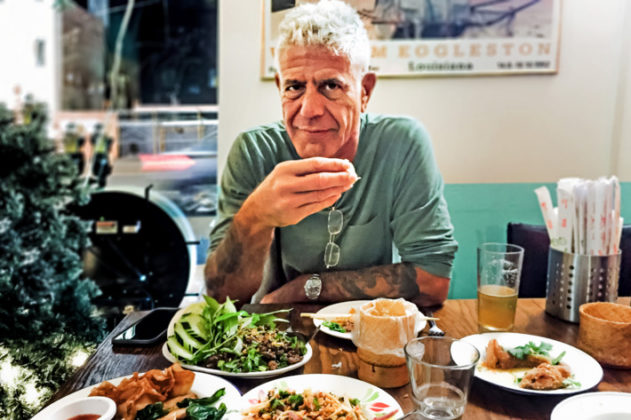We watched Bourdain be moved by the ways others live in this world. We watched him share in their joy. We watched him confront their suffering and his own. To make anybody feel good is an extraordinary ability, but it is also exhausting.
“Maybe that’s enlightenment enough: to know that there is no final resting place of the mind; no moment of smug clarity. Perhaps wisdom… is realizing how small I am, and unwise, and how far I have yet to go.”—Anthony Bourdain
Anthony Bourdain, author of the memoir Kitchen Confidential and creator of the TV series No Reservations and Parts Unknown, is the only celebrity to whom I’ve written fan mail. In 2008, in the summer before Barack Obama’s presidential win, I moved to rural Alabama for my first teaching job, and wrote to No Reservations to suggest a show in Birmingham, focusing on the chef Frank Stitt and his contributions to the transformation of city’s south side.
Mostly, though, my letter to Bourdain talked of the isolation I felt living in an unincorporated part of Hale County, Alabama, in a place that didn’t quite know what to do with an upstate New York transplant like me, nor I with it. I told Bourdain that if anyone could help Alabama feel more like home—if anyone could find the story of what we shared—it was him.
I never heard back (I used an online form on the show’s website, and don’t even know if Bourdain read the slush pile of show suggestions it collected), but I began teaching Bourdain’s storytelling as a regular feature of my first-year writing courses in Alabama. My students would pick a location from my No Reservations DVDs, and we’d analyze how Bourdain let the story of a place and its people emerge through the lens of food, which is itself a lens on history. Guided by Bourdain’s ethos of curiosity, my students learned implicitly the value of Keats’ negative capability, of letting inquiry over certainty drive the work of writing. Bourdain was a rhetorical master, and my students, who were sometimes skeptical of the readings I assigned, loved him. As he was for so many who watched his shows and read his books in order to better understand our globalized world, Bourdain acted as an interlocutor between my students and me, helping us communicate across differences, across contexts. Today, several of those students have shared their sorrow over Bourdain’s death.
It’s no surprise that a man who dedicated his life to breaking bread with people all over the world, in James Beard award-winning restaurants and on the ground beside a fire pit in Namibia and at the Waffle House over scattered, smothered, and covered hash browns and everything in between, despaired at the divisions in post-2016 America, and urged his fellow leftists to ditch their pearl-clutching and begin knitting our social fabric back together by first assuming we can relate to one another. It was a tall order for me at the time. But then one of those students from Alabama emailed me to say he respected me despite our opposing politics, and hey, he was having twins! I thought of Tony and how he’d probably joke with the student about the worst blow-out diaper he’d ever seen, or the longest stretch without sleep he’d gone when his daughter was an infant. I thought how easy connection can be.
A friend wrote today of Bourdain’s enthusiasm for meals served by people at white-cloth tables and “off a hot plate on the back of their motorbikes,” and that despite Bourdain’s image as a “bad boy chef,” she could see his “sensitive and open heart.” It is precisely that sensitivity—that sincerity always rising above the acerbic wit—that makes me see plainly for the first time how Bourdain’s much-idealized life of travel could be hard on an empath. We watched Bourdain be moved by the ways others live in this world. We watched him share in their joy. We watched him confront their suffering and his own. To make anybody feel good is an extraordinary ability, but it is also exhausting.
I grew up in the restaurant business and recognized my experiences waiting tables in Kitchen Confidential, especially the dynamics among the staff—the incestuous relationships, the penchants for excess, the tolerance of deep flaws and quirks and arrest records, the human mechanics that either made you work as one or fall apart. My father owned a successive line of sports bars with the kind of lived-in vibe I’ve always thought Bourdain would like (the wings were good, too), and when my father died from a heart attack at 63, it was his employees who were waiting at the bar, cleaning and crying and taking shots of Jezynowka, when I came in early the next morning. They’d never gone home.
Tony, I know that’s not what you want us to do. You want us to move. You want us to eat meat in tube form. You want us to seek out what we don’t know with our hearts open, unafraid of truth or each other.
Amy Monticello is an assistant professor at Suffolk University. Her most recent collection of essays, How to Euthanize a Horse, won the 2016 Arcadia Press Chapbook Prize and can be purchased directly at amymonticellowriter.com. Other work has appeared in many literary journals, and at Salon, The Rumpus, and Brain, Child Magazine online. She currently lives in Boston with her husband and daughter. Follow her on Facebook, Twitter, and Instagram.
Other Links:

